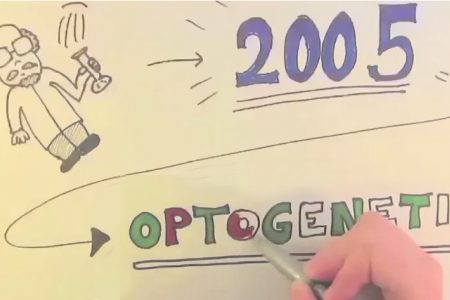Good stress - bad stress
Is there such a thing as good stress? Or is stress always bad? Should we avoid all stress to live a long and healthy life? These were some of the questions Valerio Zeno posed in his tv-show Valerio4Ever, on his quest for eternal (or a very long) life.
Stressors vs. stress reactions
To answer these questions, we should first define the difference between stressors and stress reactions. A stressor is an event, thing, or even thought that can elicit a stress reaction. The stressor can be a challenging experience, such as your first day at a new job, an important presentation, a grant application, or a thrilling race in a Formula-1 car. The stress reaction, on the other hand, is your physical and mental reaction to such stressors. During the stress reaction the brain releases a cascade of hormones (including adrenalin and cortisol) that affect a person’s body and mind. These hormones prepare the individual for a response to the stressor; this is often called the fight-or-flight response.
Challenge or threat?
Research has shown that stressors have some inherent characteristics. Situations that are uncontrollable, cognitively challenging, or painful can elicit strong stress responses. Being socially evaluated or receiving negative feedback also increases the level of stress. However, there are big individual differences in how potential stressors are perceived. While some people see dangerous or complicated tasks as a challenge, other may perceive them as a threat. Think of lecturing to a large group, or jumping out of an airplane with no more than a parachute on your back. When we feel challenged, we believe there will be, or can be, a good outcome. When we feel threatened, on the other hand, we experience fear or anxiety about what is to come.
Coping strategies
These individual differences may be due to different levels of tolerance for uncertainty, and some people are more confident in their abilities than others. Practical skills, knowledge, and past life experiences can also shape how we perceive specific events or circumstances and determine our coping abilities, i.e., how we deal with stressors. Coping strategies range from being able to accept situations as they are and refocusing to, on the negative side, envisioning the worst possible outcomes and ruminating about past events.
Good stress or bad stress?
Off course there are situations that are threatening for everyone, such as when we are faced with dangerous, potentially life-threatening situations, like an assault, war, or a traffic accident. These are referred to as traumatic stressors. But with regard to more daily stressors, we could say that good stress or bad stress is largely in the eye of the beholder.
Health effects
Back to the stress reaction. The physical and mental reactions to stressors are in principle adaptive, and evolutionarily beneficial, as we need to be able to respond to threats. However, while such responses are beneficial for survival under certain circumstances, they can become problematic if a stressor is purely in your mind (due to deadlines or social pressure, for instance), or when the stress system is chronically activated. When the stress system is chronically activated, its internal feedback system can become hampered, leading to an overactive stress system, which in turn can lead to major dysregulation of the system in the long run. Such dysregulation of the stress system has been associated with changes in specific regions of the brain (like the hippocampus and prefrontal cortex) as well as with changes in the immune system, increasing the risk for both mental illnesses (e.g., anxiety and depression) and physical illnesses (e.g., obesity, cardiovascular disease, and auto-immune disorders).
Genes
Interestingly, scientists have found that the effects of chronic or traumatic stress can even be ‘read’ in the genes. Biological imprints of stress can be found at the so-called epigenetic level. Epigenetics refers to mechanisms that influence the activity of genes, without changing the genetic code itself. One such epigenetic mechanism is methylation. Severe stress has been found to change the methylation levels, and thereby the activity, of stress-related genes, as well as genes involved in the immune system and neuronal growth. Currently, we are collaborating with Carolina de Weerth of the Radboud University in Nijmegen and Kieran O’Donnell of the Douglas Mental Health University Institute in Montreal to examine such epigenetic signatures in children in their first ten years of life. We aim to measure the levels of stress these children experience by reading their epigenome, and perhaps also gain insights into the stress experienced by their mothers during pregnancy or even before.
Next generation
It is thought that sensitivity to stress can be transmitted from generation to generation, not only by interactions between parents and their children, but also via epigenetic changes. These changes may prepare offspring for future stressors, and could thus be seen as an adaptive mechanism. However, whether such changes in the epigenome and associated stress systems are needed (i.e., good or bad) in a next generation depends on the environment in which this new generation develops.
Invest in coping styles
All in all, while the stress reaction is meant to prepare the body and mind for action to deal with everyday challenges or dangerous situations and can thus be seen as a ‘good’ thing, chronic experiences of stress can have ‘bad’ effects, both mentally and physically. Since some stressors are inevitable, we should invest, both as individuals and as psychologists, in the coping styles to deal with them.
Valerio4Ever
Marieke Tollenaar bij Valerio4Ever over effect van stress op het brein.





